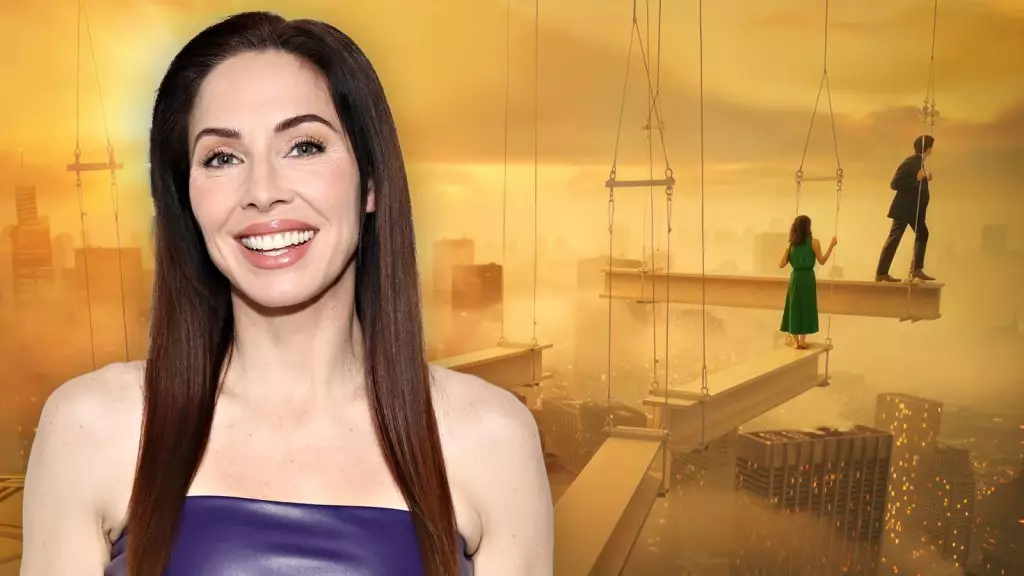Whitney Cummings, a well-known comedian and the host of the game show “Fast Friends,” recently recounted an audition experience for the highly anticipated film “Megalopolis,” directed by cinematic titan Francis Ford Coppola. This anecdote, which she shared during an episode of the “Good For You” podcast, offers a glimpse into the often tumultuous world of auditions, particularly when working with renowned directors. Cummings described the event as a moment that evoked feelings of “horror” and “humiliation,” framing it as a sticking point in her career that many can relate to, albeit with a distinct comedic twist.
In the lead-up to her audition, Cummings dedicated several days to perfecting her lines, which speaks to her professional commitment and work ethic. However, upon arriving at the audition venue, she quickly sensed that the atmosphere was unusually tense. Cummings’ observation that “everyone is so quiet” struck a chord, as it highlighted a common dilemma faced by actors: the difficulty in navigating an environment that seems to lack the typical energy and camaraderie of an audition setting. Instead of feeling welcomed or encouraged, she felt isolated and confused—an emotional state that amplified her anxiety.
As Cummings entered the room, the situation only grew more bewildering. Unlike traditional auditions, which typically involve performing prepared scenes, Coppola opted for a much different approach: improvisation. Cummings was met with unexpected prompts, such as bidding farewell to a son going off to war in an English accent and confronting her husband using an Australian accent. These requests made her question whether the entire audition was some elaborate prank or joke, an impression further solidified by her association with the show “Punk’d.” Such absurdity left her feeling as though she had entered a surreal, comedic nightmare rather than a professional audition.
Through her account, Cummings eloquently describes a sensation many performers can understand: disassociation. While improvising under pressure, she admitted to “glazing over” and losing sense of self amidst the bizarre scenario. This state of mind proved detrimental, making it difficult for her to engage meaningfully with Coppola and the improvisational exercise presented to her. Cummings humorously questioned the director’s skills in improvisation, implying that his prowess might have waned since his iconic works like “Apocalypse Now.” Her sardonic tone underscores the tension between great artistry and the vulnerability of the actor.
After the auditions, Cummings’ feelings of embarrassment deepened when Coppola presented her with a signed copy of his new book, an act she found misleading and humiliating. The experience culminated in receiving a gift—a bottle of Coppola wine—that felt more like a consolation prize than an acknowledgment of her effort. This chaotic end to an already surreal audition paints a vivid illustration of the psychological rollercoaster actors face in high-stakes situations.
Cummings’ experience serves as a reminder of the less glamorous aspects of the acting profession. The pressures of auditioning, particularly for an iconic director, can distort the very essence of creative expression. While some auditions lead to thrilling roles and career advancements, others become cautionary tales marked by confusion and embarrassment. Cummings’ narrative reminds us that behind the façade of stardom lies a series of vulnerable moments that define an actor’s journey.
The story of Whitney Cummings’ audition for “Megalopolis” is one of both tragedy and humor—a blend that Cummings herself navigates with finesse. While her experience was undeniably humiliating, it also underscored her resilience and adaptability as a performer. This anecdote illustrates that in the unpredictable world of acting, it is often the humiliating moments that later become comedic gold, allowing artists to connect with their audiences through shared experiences of failure and resilience. In the end, Cummings’ story is not just about an awkward audition; it’s a celebration of the unpredictability inherent in the creative arts, affirming that laughter often emerges from life’s most uncomfortable situations.

